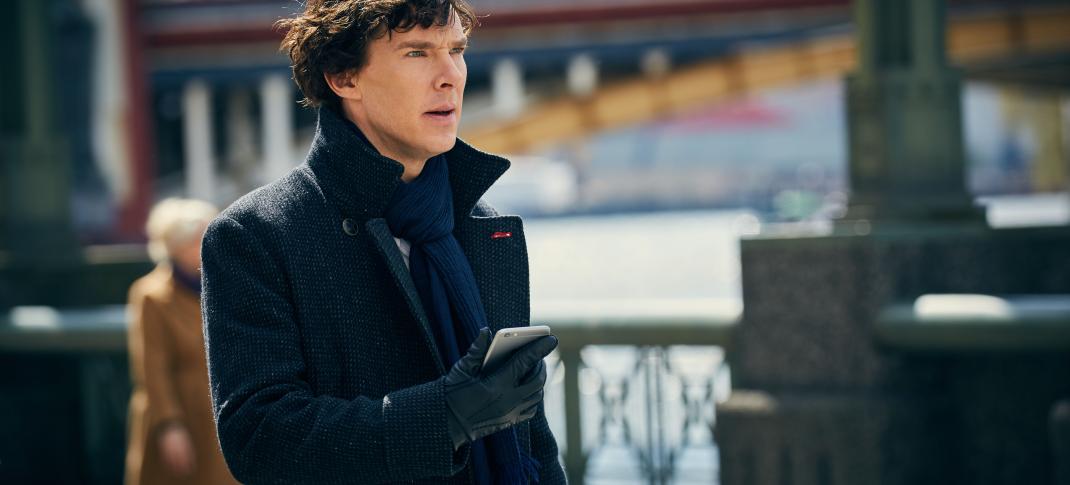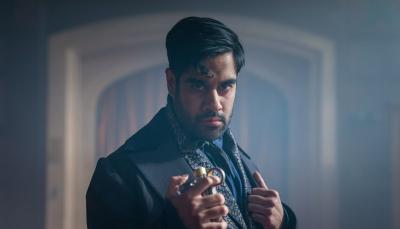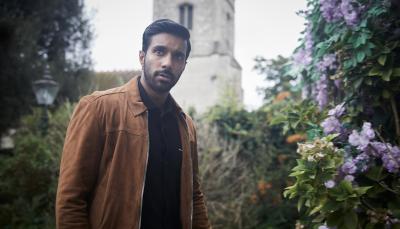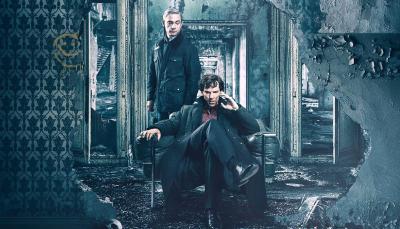'Sherlock' Season 4: 'The Six Thatchers' Recap

Sherlock, Season 4 Sundays January 1 - 15 On MASTERPIECE Mystery! on PBS Picture shows: Sherlock Holmes (BENEDICT CUMBERBATCH) For editorial use only. Not for use on social media. Courtesy of Hartswood Films & MASTERPIECE
Hartswood Films 2016
Finally! After what feels like a million years but is actually only three, Sherlock is back with a proper full series. (I’m not counting the Victorian one-off special that aired during early 2016 in this, if only because that episode was really weird, and didn’t actually advance the story of the show at all.) It’s been a while since we’ve spent some quality time with the boys of Baker Street, and Season 3 was both controversial and rather tumultuous, so who knows what to expect in Season 4. Anything, apparently.
“The Six Thatchers” kicks off the new season in style – it’s very intriguing to look at, and it features star Benedict Cumberbatch at his absolute manic best. But is it a good episode? That’s…a more complicated question. In some ways, “Thatchers” isn’t what we expect from a Sherlock episode at all. The “case” as it were, is paper-thin, and serves only as a cover for the character issues that the show wants to explore around it. That’s not a bad thing, per se, but it doesn’t always work. There’s too much time here spent on flashbacks and the primary story edges a bit on the side of soap opera. Maybe there was nothing that could live up to the expectations we as viewers place on new episodes of Sherlock, but “Six Thatchers”, despite several bright spots, was a rather disappointing return.
Why? Let’s talk about it.
First, We Need to Wrap Up a Few Things. The Sherlock Season 3 finale was an eventful episode, and left more than a few loose ends. They include the potential return of Sherlock’s ultimate nemesis Moriarty, the death of Charles Augustus Magnussen, and Sherlock's subsequent punishment for murdering him, which was to be sent off on a secret agent mission to die. Well, if you were worried about most of that, don’t be. The show ditches it all within the first ten minutes of this episode.
Sherlock, having been summoned back to British soil to deal with the mysterious Moriarty video, is pretty much immediately pardoned and reinstalled to society. Mycroft has had his people doctor the video evidence that shows Sherlock murdering someone, so that it looks as though Magnussen was killed by a wayward sniper. No muss, no fuss, and none of that nasty introspection we thought that Sherlock and/or Sherlock might have to go through in the wake of making its lead character a killer. This move not only completely undercuts all the drama at the end of the Season 3 finale, but is just so extremely lazy. There’s no growth for Sherlock here and no consequences for his actions, just what seems to be a driving desire to move us all along from something that happened three years ago that no one wants to deal with anymore. (Not that I even know what I want “dealing with it” to really look like – but an acknowledgement from Sherlock that what he did was Not Good and Not Normal would be great.)
Then Everything Moves On. Sherlock decides that the best way to suss out Moriarty’s posthumous game plan is to sit and wait. So he obsessively starts taking on smaller cases to solve in the meantime. Like REALLY obsessively. He’s constantly on his phone – texting and solving and looking at new prospects. But no case pings his internal Moriarty radar, and so the after death cat and mouse game continues.
Instead, he seems to decide that now is the time to begin his ultimate transformation into the absolute worst version of himself. It’s not an accident that Sherlock in this episode is increasingly awful – rude, obnoxious, arrogant, and dismissive of everyone around him, whether they’re potential clients, friends or family. And in some ways this makes sense – thanks to Mycroft, his absolute worst actions have been both validated and essentially erased. He has literally gotten away with murder. Why wouldn’t he believe that he’s smart enough to avoid all consequences for everything forever?
Meanwhile, John and Mary have their baby. They name her Rosamund Mary Watson and ask Sherlock, Mrs. Hudson and Molly to be godparents. Sherlock shares a rather adorable scene with the baby, and is now also apparently BFFs with Mary. (They go out solving cases together, and she’ apparently “better” at it than John is.) He insists he’ll know when “The game is on” again. Moriarty’s surefire plan to punish Sherlock after his death sure is taking its sweet time.

Possibly This Is Not the Story We Thought We Were Getting? Probably the reason the Moriarty plot never really goes anywhere is that it’s not really the focus of this episode. Despite the many quick-cut case references, and the small story involving what happened to the Cabinet minister’s son, “The Six Thatchers” isn’t really an episode about Sherlock Holmes solving a mystery. It’s an episode about the past, and its story is actually about Mary.
The episode's main “case,” as it were, initially revolves around disappearing and/or broken busts of former British Prime Minister Margaret Thatcher. At first Sherlock is curious if these things have something to do with Moriarty, but after he has to fistfight a random stranger over one of them, he learns otherwise. It turns out, the Thatcher busts are all about Mary. Inside the smashed remains of one of them, he discovers a flashdrive with “A.G.R.A” on it, just like the one Mary gave John in Season 3. (John, if you’ll recall, stupidly burned it in the Holmes’ family fireplace.) The man – whose name is Ajay - claims that Mary betrayed him and that because of this she’s a dead woman walking. Ajay just spent the previous six years being tortured and had hidden the drive full of secrets in a Thatcher bust to prevent his tormentors from getting hold of it. (The bust were being shattered because he was breaking all of them in search of it.)
Sherlock fills Mary in on the apparent threat to her life, and then it’s time for a flashback. Apparently six years ago, Mary led a black ops team to rescue a kidnapped ambassador in Tblisi, Georgia. “A.G.R.A” was the code name for her secret group of super-efficient assassin types, with each letter standing in for one of their names. Alex, Gabriel, Ajay and Rosamund. (Sidebar: Mary really named her daughter after….herself?) The point of the flash drives was to ensure absolute trust between their group. They guaranteed they’d never betray one another, because at any given time each individual person could utterly destroy any other with the information on those things. Anyway, their extraction mission in Tblisi went sideways and Mary had always believed she’d been the only person who’d escaped. She’s excited to learn that the man Sherlock fought – Ajay – is still alive, but less excited when she learns that he’s trying to kill her.
There’s Something About Mary. Despite Sherlock reminding Mary that he made a blood vow or whatever to keep her safe, she apparently doesn’t think that’s going to provide anything much in the way of actual security. So she leaves John a letter and takes off on the run. In her note, Mary tries to explain that she’s very sorry, but she just wants to keep everyone safe from the consequences of her past. There’s a kind of fun but largely pointless montage where Mary secret agents herself all over the world, complete with costume changes and a variety of wigs of varying quality. She’s picking her destinations via rolling some dice, so her larger plan is not…incredibly clear here. But it doesn't really matter, because Sherlock and John track her down in Morocco anyway, thanks to the tracking device he stuck to her A.G.R.A. flash drive.
So, John has finally had it with the constant lies from Mary – though, on the grand scale of things is running away to lead the hired killer that will doubtless target your family away from them really as bad as most of the other things she’s done? Probably not, if you ask me. Anyway, John finally wants to know about A.G.R.A. and wow, dude, you could have saved us all so much time if you’d just looked at the stupid flash drive back in Season 3 instead of making some dumb grand gesture with it. Thanks a lot! They have something of a domestic, but honestly, it’s not as big as the fight they probably need to have. It’s probably hard to really get into things properly while you'er in a foreign country with Sherlock sitting there intoning ominously about how he’s going to protect everyone like he’s the Terminator.
Of course that’s exactly when Ajay shows up, because while Sherlock followed Mary thanks to tracker on the A.G.R.A. drive, Ajay just followed Sherlock. (These two are really not good at this!) And everyone ends up in a standoff with guns drawn. Mary tries to explain that she though he was dead, but Ajay seems uninterested in what she has to say. She waxes a bit nostalgic about how they were all comrades in killing for hire or something, but he’s basically spent six years fantasizing about how to kill her. Ajay ultimately gets killed when the cops show up, summoned by the little boy Sherlock had made friends with earlier. And of course he dies before he can tell Mary any more about the woman who apparently betrayed A.G.R.A by alerting the terrorists that they were coming to rescue the ambassador. (A.K.A. the reason they were all killed and/or tortured.)
There’s a weird – not romanticizing here, but almost – vibe about what A.G.R.A. was and did going on here. Despite the fact that this particular story centers around the team being sent in to rescue people being held hostage by terrorists, in all honesty this group sold their services to the highest bidder for lots of different kinds of jobs. Some of them were probably very unsavory. If we’re going to finally unpack the issues surrounding Mary and her past, aren’t those the stories we should be looking at too? These people weren't exactly heroes.

The Thing We Were Waiting for Happened. If you know anything at all about the Sir Arthur Conan Doyle Sherlock Holmes canon, you were probably ready for this episode’s big twist. Let’s be real: We were kind of all waiting for Mary Watson to die. And now that it’s happened, it somehow manages to feel both anticlimactic and frustrating.
Anyway, what happens is that Sherlock figures out that the person who betrayed A.G.R.A was the woman who’d been serving as the secretary to Mycroft's secret high-powered group of government officials. Her name is Vivian Norbury, and she’d made a tidy sum over her life selling secrets. She’d used A.G.R.A and the fall out from the coup in Tiblisi to try and cover her tracks after someone discovered her lucrative side business. He corners her in the London Aquarium, presumably as payoff to the fact that there's been a lot of really aggressive shark imagery in this episode.
Mycroft and his minions arrive, ostensibly to arrest Vivian. But Sherlock can’t help himself and launches into a long monologue on how much he knows about her, including deductions about her many cats and sad life alone. This riles Vivian up, Bond-villain style. “Maybe I can still surprise you,” she intones, before raising the gun she’s brought with her. Everything goes into slow-motion as the gun fires. Mary jumps in front of Sherlock and takes the bullet meant for him. John, of course, arrives just in time for his wife to die in his arms after she manages to tell him she loves him and Sherlock she likes him, while apologizing for shooting him that one time. John collapses in moaning grief, begging Mary to stay with him. This is an exceptionally emotional scene, and at least Sherlock did make an attempt to reckon with Mary’s double life in a way that it ignored in Season 3. And, considering Mary’s controversial decision to shoot Sherlock back in that season’s finale, there is a certain amount of symmetry here. Maybe they are even now.
What Comes Next? John, who spent a chunk of this episode engaged in an emotional affair with a woman he met on the bus, is now furious at Sherlock. He blames his BFF for Mary’s death, and is angry at him for failing to honor that ridiculous “vow” he made to protect them all back at the Watson’s wedding reception. For someone who seems to spend most of his life telling Sherlock that he’s generally not as amazing as advertised, John’s sudden anger over his friend’s inability to actually BE godlike is…interesting. Of course, you can obviously read this as John acting out. Certainly he must feel guilty over whatever level of affair he’d been in the middle of having, or about to have, when his wife died and he’s taking that anger out on Sherlock. Because to be quite honest, given all the things that Sherlock has done to John, including but not limited to making him watch him leap off a building to his death, pretending to be dead for two entire years and then never telling John why, his inability to magically keep Mary from dying seems an odd thing to finally break their friendship over.
And now Sherlock has to somehow fix things between them – because Mary has charged him with doing so. A twist which I expect is meant to be sweet, but also feels extremely weird, because shouldn’t Sherlock be, oh, I don’t know, doing that anyway? We just went through an entire season in which the main narrative throughline was how much Sherlock cares about and would literally do anything for John up to and including shooting a man in the head. But sure, I guess that Sherlock would probably need a video reminder from Mary to know that John would need support and care?
Perhaps it will be worth overlooking that bit if this eventually shifts Sherlock back into a show about Sherlock Holmes and John Watson again, without all this other business. (I have to admit the prospect of watching a family crime solving sitcom was never that interesting to me.) But we’ll have to see what happens.

What is Probably NOT Coming Next. Did anyone else almost hurt themselves laughing upon realizing that this show is probably never ever, ever going to answer the Moriarty question at all? It dangled “the game” over us for this entire episode and yet somehow still nothing happened. We know nothing! We’re pretty much never going to find out what happened, are we? Ha ha ha ha ha, isn’t that funny? Not really, and I’d love to be proven wrong, but this feels SO familiar. It feels just like that time that both the “cliffhanger” finales of Seasons 1 and 2 were resolved in completely unsatisfactory ways. It feels like that time Sherlock faked his own death and they just never told us how he did it, and that was the end of the story.
If the Moriarty video does come up again, I can’t imagine it will be anything more interesting than some trick by new baddie Culverton Smith, and everyone who hoped there was some real Moriarty connection will end up disappointed. Again, I really hope I’m wrong about that – but I’m going to start mentally preparing myself like I’m not.
A Random Aside: If anyone else absolutely LOVED the use of the “Appointment in Samarra” story that was peppered throughout this episode, you can read it here. (It’s quite short, but nifty.)
At the end of the day, this episode left me with a lot of mixed emotions. So I'm going to be interested to hear what you all think. Hit the comments and sound off!




